As his press secretary nears retirement, Pope Francis is promoting and moving key officials in the Roman Curia…
Pope Francis went to Africa for a six-day, three-nation apostolic journey, culminating in Central African Republic, a country still in the throes of a brutal civil war.
But Francis will not be coming back to anything remotely considered “peace and quiet” in Rome.
Among other things, in the coming days and weeks he is set to announce some major personnel and structural changes in the Roman Curia and other Vatican-related departments.
Changes in Communications
The extensive overhaul of the media sector, which the Pope signaled last June when he established the Secretariat for Communications, is expected to finally get underway.
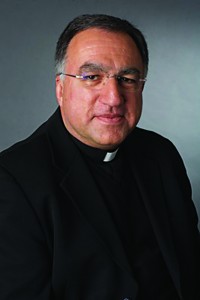
Fr. Thomas Rosica
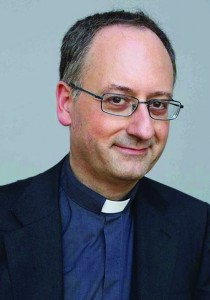
Fr. Antonio Spadaro
First of all, it appears that Fr. Federico Lombardi, who has headed the Holy See Press Office since 2006, is going to retire by the end of December.
The 73-year-old Jesuit has also been running Vatican Radio since 1991 as its program director and since 2005 as its general director.
It’s still not clear whether Francis has decided to replace him at the press office with another member of their order, 49-year-old Jesuit Fr. Antonio Spadaro, or if he’s opted to name Basilian Fr. Thomas Rosica, 56, to the post.
Spadaro is the editor of Civiltà Cattolica and is the man who conducted the blockbuster interview with Pope Francis that was published simultaneously in September 2013 by Jesuit publications around the world. The Pope has given Spadaro freedom to help shape his message and clearly values his younger confrere’s advice.
“Spadaro has the Pope’s ear,” it is often said in Vatican circles.
On the other hand, Rosica has used his fluency in several languages, an impressive theological education (he has a doctorate in Scripture) and extensive experience in developing and running a top-flight communications network (Salt + Light in Toronto) to be a highly effective Church representative in the media. A native of Rochester, New York, with dual U.S.-Canadian citizenship, he is already an at-large English attaché for the Vatican press office. And the Pope has known him for several years.
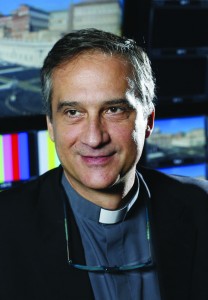
Msgr. Dario Vigano (CNS photo/Paul Haring) See POPE-COMMUNICATIONS June 29, 2015
But it is structural changes in the Vatican’s media operations that will be turned up a few more notches next month when the newly created Secretariat for Communications leaves its temporary home at the Vatican Radio building and takes over the offices of the Pontifical Council for Social Communication. It’s not clear whether Msgr. Dario Viganò, the secretariat’s prefect, will be named a bishop. The 53-year-old Milanese priest, who is not related to the apostolic nuncio to the United States with the same name, is a specialist in film and television.
It seems this change of offices is confirmation that the pontifical council will be suppressed and its president, Archbishop Claudio Maria Celli, given a new post — likely with the promise of a red hat. Celli, a career papal diplomat (he served in the Vatican nunciature in Argentina, among other places), will not be 75 until next July, but it’s possible that he could be named Archpriest of St. Mary Major. The current titleholder is Cardinal Santo Abril y Costelló, a former nuncio who turned 80 last September.
Then there’s the question surrounding the future of Mgsr. Paul Tigue, the secretary at the soon-to-be-defunct Pontifical Council for Social Communications. The 57-year-old Dublin priest could end up being named head of one the larger dioceses in Ireland — such as Meath or Cork and Ross — where the current bishops are already retirement age.
Changes at the Secretariat of State
In the coming days, Archbishop Angelo Becciù, who has been the Sostituto or Deputy Secretary of State for internal affairs since 2011, will be appointed prefect for the Congregation for the Causes of Saints. The red-hat post is a done deal for the 67-year-old Sardinian and former nuncio to Cuba. He will replace Cardinal Angelo Amato, 77, an Italian Salesian who was the No. 2 at the Congregation for the Doctrine of the Faith from 2002-2008.
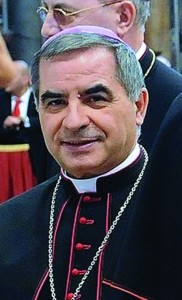
Archbishop Angelo Becciù
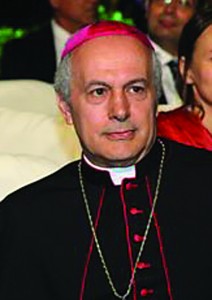
Archbishop Gabriele Caccia
And who will get Becciù’s job? There is strong speculation that Archbishop Gabriele Caccia, who turns 57 in March and is currently papal nuncio to Lebanon, is the leading candidate to become the next Sostituto. He was the Assessore (or deputy to the Sostituto) from 2002 up until 2009 when he and his counterpart in the foreign section (does the name Pietro Parolin ring a bell?) were both sent away from Rome and into exile. Pope Francis wisely brought Parolin back to be his Secretary of State. By appointing Caccia he would be reuniting a duo that — for at least their time — successfully prevented the numerous disasters that would later plague the previous pontificate.
Meanwhile, the current Assessore, Msgr. Peter Wells of Oklahoma, is frequently mentioned as the next papal nuncio to the United Nations organizations based in Geneva, Switzerland. The witty and highly competent diplomat is 52 years old and due to be promoted to the episcopacy. He would replace Archbishop Silvano Tomasi, 75, who has held the extremely important U.N. post since 2003.
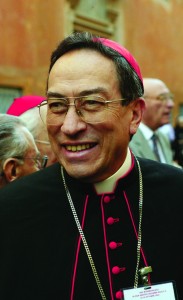
Cardinal Oscar Andres Rodriguez Maradiaga.
New Office for Laity, Family and Life
Pope Francis finally announced last month what everyone had known for more than a year — that three existing structures would be combined to make one big office to deal with issues concerning the laity, family and human life. But up to now he has not said what exactly the new body will be (such as a congregation or a secretariat) or who will head it.
Polish Cardinal Stanislaw Rylko, currently president of the Pontifical Council for the Laity, would seem to be the leading candidate to oversee the new office, even if lay people have been mentioned as possible heads of various sections. But the Pope may think it is time for the cardinal, who was ordained both priest and bishop by Karol Wojtyla, Pope John Paul II, to return to his native Archdiocese of Krakow after spending the last three decades in Rome.
He would be a natural replacement for the current archbishop there, Cardinal Stanislaw Dziwisz. The longtime secretary of the late Polish Pope turns 77 next April.
Pope Francis could turn to Rylko’s deputy (and former personal secretary to Cardinal Joseph Ratzinger), German Archbishop Josef Clemens, 68.
Or he could look to the current president of the Pontifical Council for the Family, Italian Archbishop Vincenzo Paglia, 70. On the other hand, both men are still young enough to head up dioceses in their native countries. But the Pope will have to discern whether that would really be such a good idea — and for whom.
There’s yet another possibility. Francis could name the trusted coordinator of his C9 body of cardinal-advisors, Cardinal Oscar Rodriguez Maradiaga, to be the first head of the new office for laity, family and life. The affable Salesian will be 73 next month and shortly afterwards will mark 23 years as head of the Archdiocese of Tegucigalpa, Honduras.
Now might be the right time for him to take up a new post. Rodriguez is, without a doubt, one of Francis’ most important allies. Bringing Cardinal Oscar to Rome would make perfect sense.
After all, the man who’s come as close as anyone to being the “vice-Pope” is also the one who initially suggested the idea for the new super-office for the laity. He actually said it should be a top shelf department at the level of a Vatican congregation, like those for bishops, clergy and religious.
These are just some of the personnel changes Pope Francis will be making.
There will be more, including the official announcement that several current departments will be dissolved and folded into one big office for charity, justice and peace.
Robert Mickens is editor-in-chief of Global Pulse. Since 1986, he has lived in Rome, where he studied theology at the Pontifical Gregorian University before working 11 years at Vatican Radio and then another decade as correspondent for The Tablet of London.

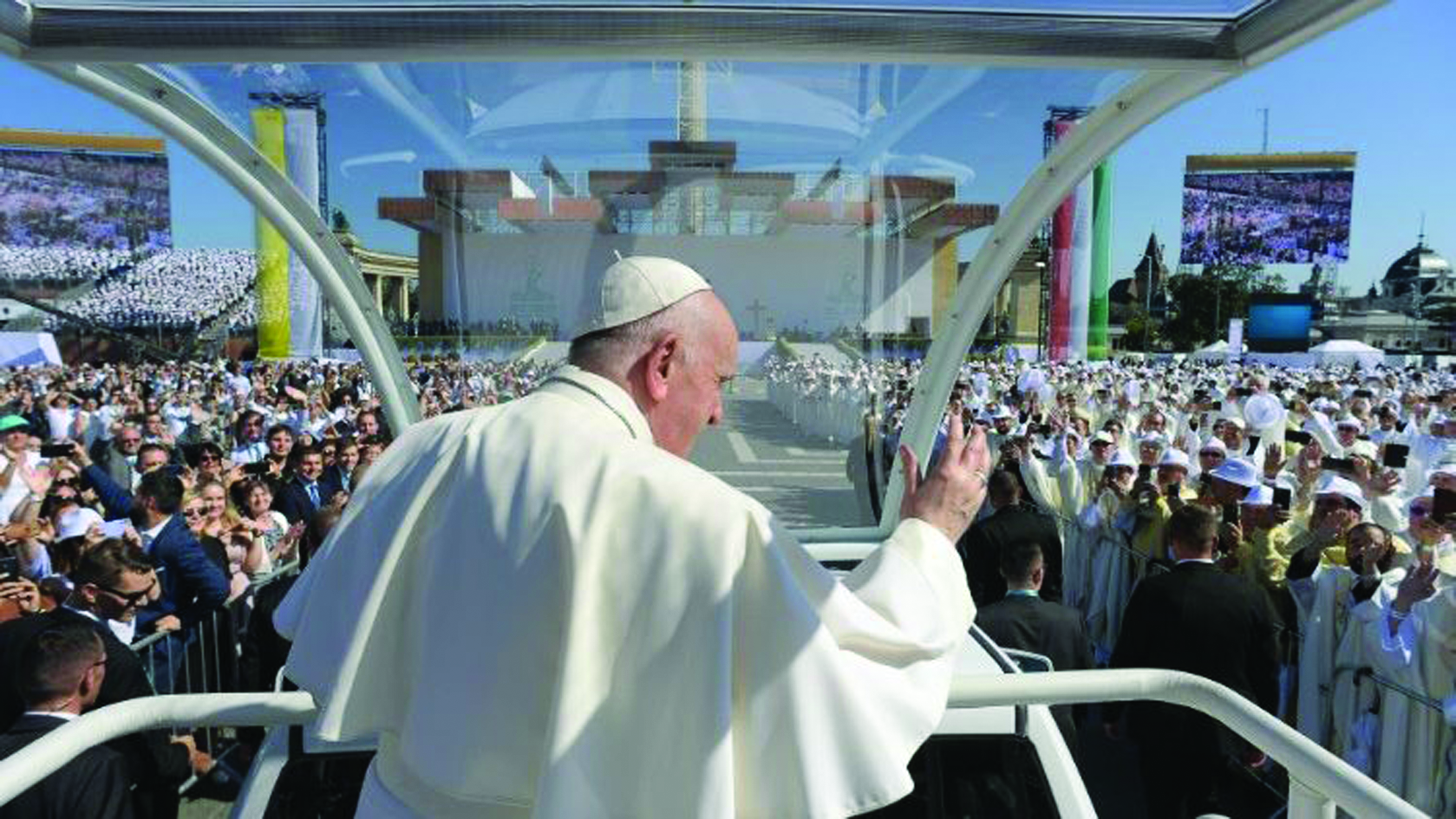




Facebook Comments